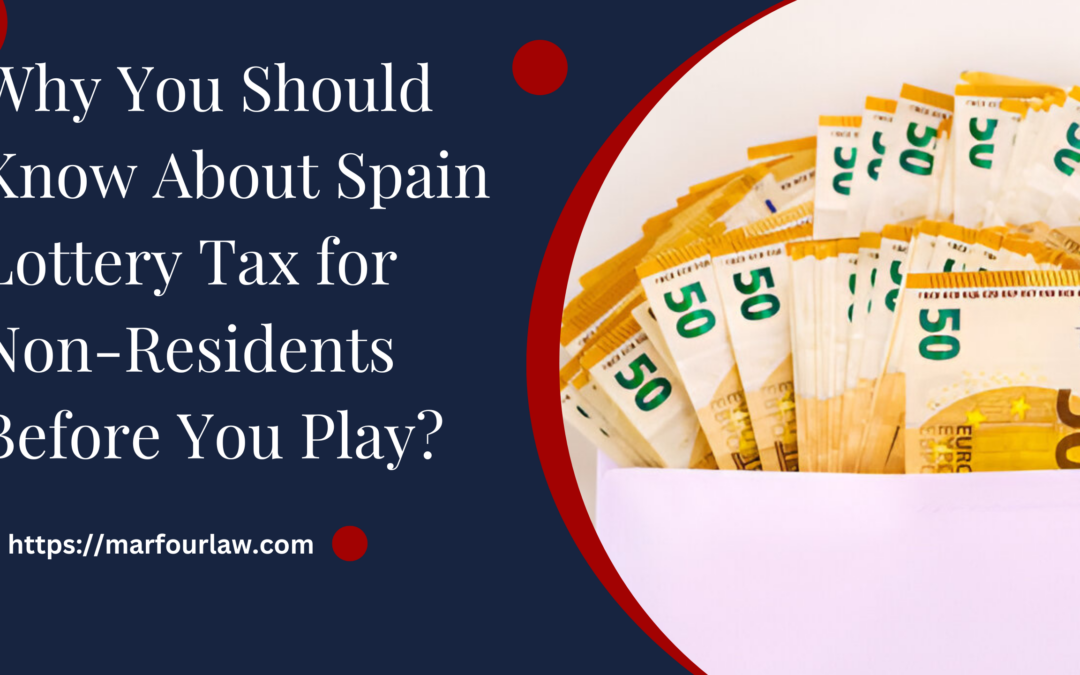Why is it important to understand the Spain lottery tax for non-residents before buying your ticket? If you’re a non-resident and you win a prize in the Spain lottery or lottery Madrid, there are specific tax rules you need to be aware of. These taxes impact how much of your winnings you actually get to keep, and being informed is the best way to ensure that there are no surprises. In this blog, we will break down everything you need to know about Spain’s lottery tax system for non-residents, so you can play with peace of mind.
How Does Spain lottery tax for non-residents for Winnings?
When you win the Spain lottery as a non-resident, the tax rules are clear but can be easily misunderstood. Here’s why it’s important to understand them before you claim your winnings.
Basic Tax Rule for Non-Residents
Spain imposes a tax of 20% on lottery winnings above €40,000. However, the first €40,000 is tax-free, meaning if you win €50,000, only €10,000 will be taxed. This rule applies whether you are a resident or not.
Tax Withholding Process
Lottery operators in Spain withhold the applicable tax from your prize before you receive it. This makes it simpler for non-residents since they don’t need to calculate the tax. However, if your country has a tax treaty with Spain, your home country may allow you to offset taxes with credits.
Why Knowing Tax Rules is Important
Not understanding Spain’s tax system can lead to unexpected deductions from your winnings. If you want to enjoy your full prize, knowing the taxation rules can save you from unwanted surprises.
What Are the Differences Between Resident and Non-Resident Taxation on Lottery Winnings?
The tax treatment for lottery winnings differs between residents and non-residents, even though the same 20% rate applies to both. Let’s explore the differences.

Taxation for Residents
For residents of Spain, lottery winnings are considered taxable income. Besides the 20% withholding, residents must declare their winnings in their annual tax return. The final tax owed depends on their total income for the year.
How Non-Residents Are Taxed?
Non-residents are only subject to the 20% withholding tax. Unlike residents, non-residents don’t need to declare the winnings in Spain, but they might still need to report it in their home country.
Be Aware of Double Taxation When Winning the Spain Lottery
Double taxation can occur if both Spain and your home country want to tax your lottery winnings. Here’s how you can avoid this.
Double Taxation Treaties Explained
Spain has treaties with many countries to prevent double taxation on lottery winnings. These treaties often allow winners to claim a tax credit in their home country for the amount paid in Spain.
Which Countries Have Tax Treaties with Spain
Many countries, including the United States and the United Kingdom, have agreements in place. If you’re from one of these countries, the amount you pay in Spain may be deducted from your home country’s tax obligation.
How to Claim Your Spain Lottery Winnings as a Non-Resident
Winning the lottery Madrid sounds exciting, but how do you actually claim your prize? Here’s what you need to know about the process.
Documentation Required for Non-Residents
To claim your winnings, you need a valid passport and proof of non-residency. Lottery organizers may ask for additional documents, such as tax identification from your home country.
Claiming Smaller Prizes
For small prizes (typically below €2,500), non-residents can claim their winnings at any authorized lottery retailer. For larger prizes, you will need to claim them through specific lottery offices or banks.
Timing and Deadlines
Make sure you claim your prize within three months from the draw date. If you don’t, the prize will expire, and you won’t be able to collect it.
What Happens If You Don’t Declare Spain Lottery Winnings in Your Home Country?
What if you forget to declare your Spain lottery winnings back home? Let’s break down the consequences.

Potential Penalties and Fines
Most countries require you to declare all sources of income, including foreign lottery winnings. If you don’t, you could face penalties, interest on unpaid taxes, and possibly legal action, depending on the country.
Reporting Process for Different Countries
Each country has different rules for reporting foreign lottery winnings. In the U.S., for example, you need to report your winnings on your annual tax return, while the U.K. typically doesn’t tax lottery winnings but may have other implications, like inheritance tax.
How to Avoid Trouble
Always check your country’s tax laws regarding lottery winnings and be upfront about declaring them. Keeping all your paperwork in order will save you from potential legal or financial headaches.
Why Lottery Madrid is Popular Among Non-Residents?
Lottery Madrid is one of Spain’s most popular lotteries. Here’s why non-residents love to participate.
Bigger Prizes and High Payouts
Madrid’s lottery games, like El Gordo, are famous for offering some of the biggest lottery payouts in the world. This makes them especially attractive to non-residents looking to win big.
Easy Participation for Tourists and Expats
Whether you’re visiting Spain or living abroad, you can easily participate in lottery Madrid. Tickets are widely available, and many websites allow non-residents to purchase tickets online, making it convenient to join from anywhere.
How Does Spain’s Tax Authority Handle Lottery Winnings Audits for Non-Residents?
Wondering if your winnings could be subject to an audit by the Spanish tax authorities? Here’s how they handle lottery winnings for non-residents.
What Triggers an Audit
The Spanish tax authority may audit your winnings if they suspect any misreporting or discrepancies. Non-residents are less likely to face an audit, but it’s still possible if you win a large sum.
Documents You Need to Keep
Always keep your ticket, payment records, and any tax forms related to your lottery win. These documents will help you in case of an audit and ensure you can prove everything is in order.
How to Prepare for an Audit
If you receive a notice for an audit, consult with a tax professional who understands Spanish tax law. They can guide you through the process and make sure all your documents are in order.
Why It’s Important to Get Tax Advice Before Playing the Spain Lottery as a Non-Resident
Getting professional tax advice is crucial if you’re a non-resident thinking about playing the Spain lottery. Here’s why.

Navigating International Tax Laws
Tax laws vary from country to country, and a professional can help you navigate both Spain’s tax rules and those of your home country.
Avoiding Legal Complications
With the right advice, you can avoid common pitfalls, such as double taxation or failure to declare winnings, which could lead to penalties.
Marfour is an international law firm that provides expert legal services tailored to clients navigating complex legal landscapes across borders. Specializing in areas such as business law, immigration, and tax consulting, Marfour delivers personalized solutions to meet the unique needs of both individuals and businesses. With a global reach and deep understanding of local regulations, Marfour ensures that clients receive strategic legal guidance and comprehensive support for their legal challenges, whether they involve cross-border transactions, residency matters, or tax obligations. Marfour is committed to delivering excellence and peace of mind in every legal endeavor.
FAQs
Do non-residents pay the same tax as residents on lottery winnings?
Yes, both residents and non-residents are subject to the 20% tax on winnings above €40,000.
Can I avoid the Spain lottery tax as a non-resident?
No, the 20% tax is mandatory, but you may be eligible for tax credits in your home country under a tax treaty.
Is there a deadline to claim Spain lottery winnings?
Yes, you must claim your prize within three months of the draw date.
Do I need to declare Spain lottery winnings in my home country?
This depends on your home country’s tax laws. Some countries require you to declare all foreign income, including lottery winnings.
Can I play the Spain lottery online as a non-resident?
Yes, non-residents can purchase tickets for Spanish lotteries online, and the same tax rules apply.
Conclusion
Playing the Spain lottery as a non-resident can be a thrilling experience, but it’s essential to understand the tax implications before you play. By being aware of the 20% tax rule, double taxation treaties, and the requirements for claiming your prize, you can avoid any unexpected surprises and enjoy your winnings. Always consult with a tax professional to ensure you meet all obligations both in Spain and in your home country.

